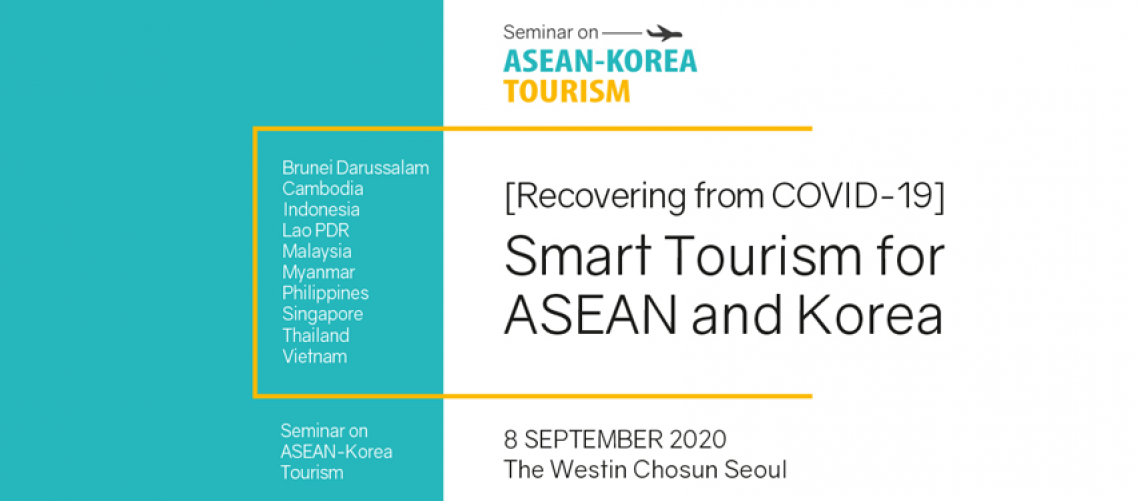SEOUL, 3 SEPTEMBER 2020 – The ASEAN Korea Centre will hold a webinar on ASEAN-Korea tourism titled “Recovering from COVID-19: Smart Tourism for ASEAN and Korea” on Tuesday, 8 September at 13:30 (KST) through YouTube livestreaming.
The webinar is co-organized with the Korea Tourism Organization and Travie, Korea’s leading travel media. It aims to boost ASEAN and Korea’s tourism industries through smart tourism amid the COVID-19 pandemic. Participants are required to pre-register here.
The webinar is composed of two sessions – “ASEAN-Korea Tourism toward Post-Pandemic Recovery” and “Smart Tourism for Business.” The first session will present an analysis of current tourism trends and prospects by experts from the Korea Tourism Organization, the UN World Tourism Organization (UNWTO) and the ASEAN Tourism Competitiveness Committee, chaired by the Philippines.
The second session will feature business strategies and responses from both ASEAN and Korean tourism start-ups, including Traveloka, Trip Hunter, Mobile Toong and H2O Hospitality.
Professor Lee Seul-ki from Sejong University will moderate a panel discussion on practical measures for reinvigorating tourism in ASEAN and Korea that will be followed by a Q&A in which viewers can also partake.
The tourism industry is one of the most heavily affected sectors hit by the unprecedented COVID-19 crisis. According to the UNWTO, global tourism revenues could fall by as much as $1 trillion in 2020.
Secretary General of the ASEAN Korea Centre Lee Hyuk noted that “ASEAN, where tourism accounts for 12% of the total GDP, is speeding up efforts and cooperation at bilateral and multilateral levels, as the ASEAN region is expected to have a significant impact after COVID-19. I hope this webinar will provide a meaningful platform to discuss how tourism between ASEAN and Korea can resume in the future with the advancement of digital technology.”
The webinar will be streamed live on the ASEAN-Korea Centre YouTube channel, and anyone wishing to participate can pre-register through the link below:
- ABOUT ASEANThe Association of Southeast Asian Nations, or ASEAN, was established on 8 August 1967 in Bangkok, Thailand, with the signing of the ASEAN Declaration (Bangkok Declaration) by the Founding Fathers of ASEAN: Indonesia, Malaysia, Philippines, Singapore and Thailand. Brunei Darussalam joined ASEAN on 7 January 1984, followed by Viet Nam on 28 July 1995, Lao PDR and Myanmar on 23 July 1997, and Cambodia on 30 April 1999, making up what is today the ten Member States of ASEAN.Menu
- WHAT WE DO
ASEAN organs always strive to achieve ASEAN’s goals and objectives, the Secretary-General of ASEAN and the ASEAN Secretariat shall be functioned as coordinating Secretariat to help facilitate effective decision-making withing and amongst ASEAN bodies. In addition, each Member State shall appoint a Permanent Representative to liaise with Secretary-General of ASEAN and the ASEAN Secretariat
Menu - WHO WE WORK WITH
ASEAN shall develop friendly relations and mutually beneficial dialogues, cooperation and partnerships with countries and sub-regional, regional and international organisations and institutions. This includes external partners, ASEAN entities, human rights bodies, non-ASEAN Member States Ambassadors to ASEAN, ASEAN committees in third countries and international organisations, as well as international / regional organisations.
Menu - OUR COMMUNITIES
The rodmap for an ASEAN Community (2009-2015) was declared by the leaders in 2009. The ASEAN Community, anchored on three community pillars: Political-Security Community, Economic Community, Socio-Cultural Community was launched in 2015. The ASEAN 2025: Forging Ahead Together was introduced in 2015 as a Post-2015 Vision. It comprises the ASEAN Community Vision 2025, the ASEAN Political-Security Community Blueprint 2025, the ASEAN Economic Community Blueprint 2025 and the ASEAN Socio-Cultural Community Blueprint 2025
Menu - SITEMAP





